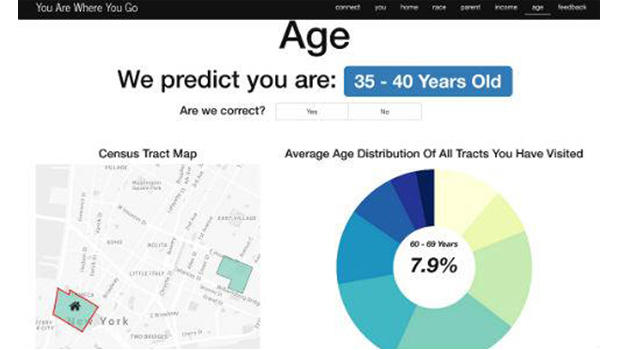Location data from just two of your apps is enough to reveal your identity
Those who regularly post social media updates might want to think twice about including their geotagged locations. New research out of Columbia University and Google highlights privacy concerns for those who use social media apps, with the discovery that it may take just two apps to reveal enough information to link the accounts to the the same person. The findings are being presented Thursday at the World Wide Web conference in Montreal.
Those who like to show off the cool locales displayed in their Instagram photos or check in at a restaurant on Facebook might be left a little uneasy by the study's findings.
The researchers created an algorithm that compares geotagged Twitter posts with those on Foursquare and Instagram from the same user. The algorithm calculates the probability that one person posting at any time and place could be posting from a second app at a different moment in time. This same algorithm can also identify shoppers' identities by matching anonymous credit card purchases against mobile phone logs that ping from the closest cell tower.
"If you look unique in how you make phone calls, it is possible to connect that to where you've made credit card purchases," study co-author Chris Riederer, a computer science graduate student at Columbia Engineering, said in a press release.
The results are similar to those from past studies looking data points like four credit card purchases being enough to pick individual shoppers out from millions of others making transactions at the same time. Now with social media posts, it may be possible to pinpoint a user's identity by matching his or her movements across just two data sets.
"Many people choose not to identify themselves online," study author Augustin Chaintreau, a computer science professor at Columbia Engineering and a member of the Data Science Institute, said. "If I now tell you that your location data makes you recognizable across all of your accounts, how does that change your behavior? This is a question we now have to answer."
With the prevalence of social media apps, this could be a potent concern for many smartphone users, the researchers suggest. Location tracking is embedded in mobile apps because it makes life easier for users. It can help them get directions, find a nearby bank or a bar to go out to in the evening. But with this convenience comes potential security pitfalls.
By analyzing geolocation data across apps, the study shows it's possible to determine a user's identity and information like their age, ethnicity, and gender, among other sensitive details.
"What this really shows is that simply removing identifying information from large-scale data sets is not sufficient," Yves-Alexandre de Montjoye, a research scientist at the MIT Media Lab who was not involved in the study, said in the release. "We need to move to a model of privacy-through-security. Instead of anonymizing data and making it public, there should be technical controls over who gets access to the data, how it is used, and for what purpose."
To examine exactly how revealing this social media app data is, Riederer and Columbia undergrads Danny Echikson and Stephanie Huang created "You Are Where You Go," a tool where people can audit their social media data trail.
The tool can retrace users' steps on apps like Foursquare, Instagram, and Twitter and then use algorithms to process the data from these apps, drawing pretty accurate conclusions about a user's age, income, ethnicity, and even whether he or she has children.
In short, this social media data is extremely revealing.
"People are now sharing their location on a growing number of apps, often without realizing it," Riederer cautioned. "Companies no longer have to be very sophisticated to access this data and use it for their own purposes."
The team hopes to include more social networks to the tool in the future , and give users the chance to donate the data collected to science or offer recommendations for the further expansion of this research.
